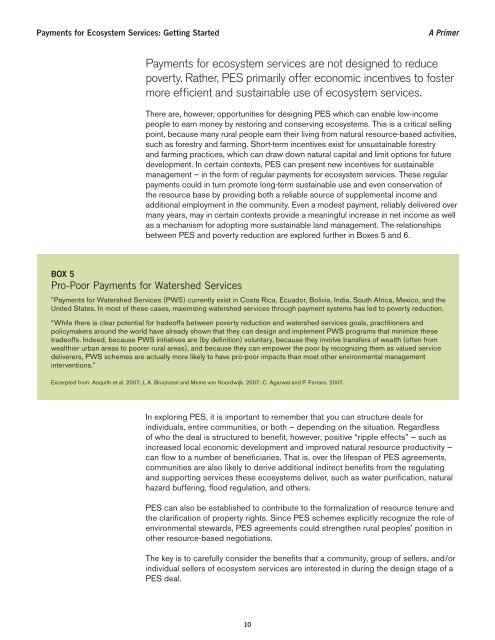Payments for Ecosystem Services: Getting Started. A Primer - UNEP
Payments for Ecosystem Services: Getting Started. A Primer - UNEP
Payments for Ecosystem Services: Getting Started. A Primer - UNEP
You also want an ePaper? Increase the reach of your titles
YUMPU automatically turns print PDFs into web optimized ePapers that Google loves.
<strong>Payments</strong> <strong>for</strong> <strong>Ecosystem</strong> <strong>Services</strong>: <strong>Getting</strong> <strong>Started</strong><br />
A <strong>Primer</strong><br />
<strong>Payments</strong> <strong>for</strong> ecosystem services are not designed to reduce<br />
poverty. Rather, PES primarily offer economic incentives to foster<br />
more efficient and sustainable use of ecosystem services.<br />
There are, however, opportunities <strong>for</strong> designing PES which can enable low-income<br />
people to earn money by restoring and conserving ecosystems. This is a critical selling<br />
point, because many rural people earn their living from natural resource-based activities,<br />
such as <strong>for</strong>estry and farming. Short-term incentives exist <strong>for</strong> unsustainable <strong>for</strong>estry<br />
and farming practices, which can draw down natural capital and limit options <strong>for</strong> future<br />
development. In certain contexts, PES can present new incentives <strong>for</strong> sustainable<br />
management — in the <strong>for</strong>m of regular payments <strong>for</strong> ecosystem services. These regular<br />
payments could in turn promote long-term sustainable use and even conservation of<br />
the resource base by providing both a reliable source of supplemental income and<br />
additional employment in the community. Even a modest payment, reliably delivered over<br />
many years, may in certain contexts provide a meaningful increase in net income as well<br />
as a mechanism <strong>for</strong> adopting more sustainable land management. The relationships<br />
between PES and poverty reduction are explored further in Boxes 5 and 6.<br />
BOX 5<br />
Pro-Poor <strong>Payments</strong> <strong>for</strong> Watershed <strong>Services</strong><br />
”<strong>Payments</strong> <strong>for</strong> Watershed <strong>Services</strong> (PWS) currently exist in Costa Rica, Ecuador, Bolivia, India, South Africa, Mexico, and the<br />
United States. In most of these cases, maximizing watershed services through payment systems has led to poverty reduction.<br />
“While there is clear potential <strong>for</strong> tradeoffs between poverty reduction and watershed services goals, practitioners and<br />
policymakers around the world have already shown that they can design and implement PWS programs that minimize these<br />
tradeoffs. Indeed, because PWS initiatives are (by defi nition) voluntary, because they involve transfers of wealth (often from<br />
wealthier urban areas to poorer rural areas), and because they can empower the poor by recognizing them as valued service<br />
deliverers, PWS schemes are actually more likely to have pro-poor impacts than most other environmental management<br />
interventions.”<br />
Excerpted from: Asquith et al. 2007; L.A. Bruijnzeel and Meine von Noordwijk. 2007; C. Agarwal and P. Ferraro. 2007.<br />
In exploring PES, it is important to remember that you can structure deals <strong>for</strong><br />
individuals, entire communities, or both — depending on the situation. Regardless<br />
of who the deal is structured to benefi t, however, positive “ripple effects” — such as<br />
increased local economic development and improved natural resource productivity —<br />
can fl ow to a number of benefi ciaries. That is, over the lifespan of PES agreements,<br />
communities are also likely to derive additional indirect benefi ts from the regulating<br />
and supporting services these ecosystems deliver, such as water purifi cation, natural<br />
hazard buffering, fl ood regulation, and others.<br />
PES can also be established to contribute to the <strong>for</strong>malization of resource tenure and<br />
the clarifi cation of property rights. Since PES schemes explicitly recognize the role of<br />
environmental stewards, PES agreements could strengthen rural peoples’ position in<br />
other resource-based negotiations.<br />
The key is to carefully consider the benefi ts that a community, group of sellers, and/or<br />
individual sellers of ecosystem services are interested in during the design stage of a<br />
PES deal.<br />
10
















